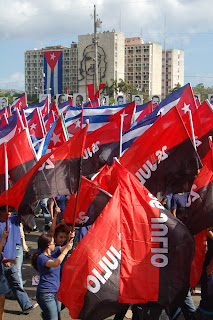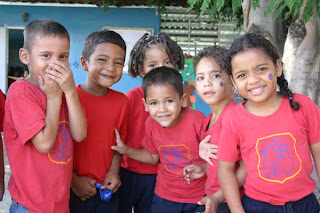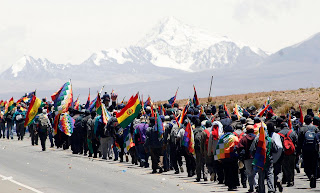"Cuba demonstrates how much nations can do with the resources they have if they focus on the right priorities - health, education, and literacy." Kofi Annan, former UN Secretary General
 |
| May Day Parade, Havana |
The current changes sweeping across Latin America have their roots in the same principles of social justice that transformed Cuban society 50 years ago.
On 1 January 1959 the Cuban Revolution freed the country from the brutal US-backed Batista dictatorship. Immediately, the government committed itself to a sweeping programme of health and education reforms, and to returning to the people the country’s natural resources and land from the hands of a local elite, foreign governments and multinationals.
Just as progressive Latin American governments are facing a backlash from the right today, Cuba has withstood extreme propaganda and attacks from the most powerful state on earth for 50 years. For 48 of these it has suffered under sustained economic warfare in the form of an inhumane and illegal US blockade – the longest in history.
Even the US itself admits the severity of its actions. According to the United States Government Accountability Office in 2009: “The embargo on Cuba is the most comprehensive set of US sanctions on any country, including the other countries designated by the US government to be state sponsors of terrorism”.
In 2007, the Personal Representative of the High Commissioner for Human Rights stated:
The restrictions imposed by the embargo help to deprive Cuba of vital access to medicines, new scientific and medical technology, food, chemical water treatment and electricity.
Numerous reports, most notably the 300-page, 1997 report by the American Association for World Health (AAWH) identify that the blockade contributes to the malnutrition of women and children, poor water quality, and lack of access to medicines and medical supplies. The AAWH declared that “a humanitarian catastrophe has been averted only because the Cuban government has maintained a high level of budgetary support for a health care system designed to deliver primary and preventive health care to all of its citizens.”
The United Nations and human rights groups including Amnesty International have condemned the blockade for violating international law, and on moral, political and economic grounds. Yet, President Obama has taken no steps to dismantle it.
US academic Noam Chomsky argues that the blockade remains in place for the same reasons it was imposed by President Kennedy in 1962:
The actual reasons for the terror and economic warfare were explained clearly at the very outset: the goal was to cause “rising discomfort among hungry Cubans” so that they would overthrow the regime (Kennedy); to “bring about hunger, desperation, and overthrow of the government” (Eisenhower’s State Department). The threat of Cuba, as Kennedy’s Latin American advisor Arthur Schlesinger advised the incoming president, is that successful independent development there might stimulate others who suffer from similar problems to follow the same course, so that the system of US domination might unravel.
Almost half a century after Kennedy, US aggression towards Cuba continues. Aside from the everyday deprivations caused by the blockade, undercover operations and open backing for invasion and terrorist attacks have been replaced by USAID funding that increasingly focus on the internet to promote so-called democracy programmes. In this manner, the US government continues to fund groups and individuals in and outside Cuba intent in bringing down the government and imposing neo-liberal models and privatisation on the island.
Despite this, Cuba maintains a healthy, educated and vibrant society. Cuba is not perfect. Like anywhere it faces problems and struggles, but its achievements and spirit of international solidarity reach across the globe. As Nelson Mandela said: “The Cuban revolution has been a source of inspiration to all freedom-loving people.”
Cuban internationalism from playing a pivotal role in the liberation of Angola and downfall of Apartheid in South Africa, to the 938 medical staff currently volunteering in Haiti, and the tens of thousands of students from developing countries receiving free Cuban medical scholarships are an inspiration to millions of people, especially in the developing world.
Through free health and education programmes for the poorest and most vulnerable on the planet Cuba offers hope that a better world is possible. And just as Schlesinger feared, US domination in the region is unravelling. As Noam Chomsky said:
Cuba has become a symbol of courageous resistance to attack. It has been invaded, subjected to more terror than maybe the rest of the world combined--certainly any other country that I can think of--and it's under an economic stranglehold that has been ruled completely illegal by every relevant international body, It has been at the receiving end of terrorism, repression and denunciation, but it survives.
The Cuba Solidarity Campaign works in the UK to campaign against the illegal blockade of Cuba and for Cuba’s right to self-determination. Please join CSC today!
Natasha Hickman, Communications Manager at the Cuba Solidarity Campaign. Please email for more information.









